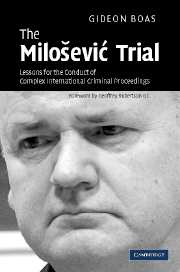Book contents
- Frontmatter
- Contents
- Foreword
- Preface
- Introduction
- 1 FAIR AND EXPEDITIOUS INTERNATIONAL CRIMINAL TRIALS
- 2 THE MILOŠEVIĆ PROSECUTION CASE – GETTING OFF ON THE WRONG FOOT
- 3 CASE MANAGEMENT CHALLENGES IN THE MILOŠEVIĆ TRIAL
- 4 REPRESENTATION AND RESOURCE ISSUES IN INTERNATIONAL CRIMINAL LAW
- 5 CONCLUSIONS
- Index
4 - REPRESENTATION AND RESOURCE ISSUES IN INTERNATIONAL CRIMINAL LAW
Published online by Cambridge University Press: 18 February 2010
- Frontmatter
- Contents
- Foreword
- Preface
- Introduction
- 1 FAIR AND EXPEDITIOUS INTERNATIONAL CRIMINAL TRIALS
- 2 THE MILOŠEVIĆ PROSECUTION CASE – GETTING OFF ON THE WRONG FOOT
- 3 CASE MANAGEMENT CHALLENGES IN THE MILOŠEVIĆ TRIAL
- 4 REPRESENTATION AND RESOURCE ISSUES IN INTERNATIONAL CRIMINAL LAW
- 5 CONCLUSIONS
- Index
Summary
The issue of self-representation is becoming a persistent and critical refrain in the trial of senior (in particular) political and military officials for serious violations of international humanitarian law. In chapter 1 I discussed the development and application of the principle in the common and civil law systems, and in regional human rights courts, and foreshadowed its emergence and treatment in international and criminal courts and tribunals. The issue was of crucial importance in the Milošević trial. It threatened the trial's fairness, and adversely impacted on its expeditiousness. The critical issues surrounding self-representation in complex international criminal trials were developed more fully and analytically in this trial than in any other to date. Following a detailed discussion of the issue in Milošević, a comprehensive analysis of the emergence of self-representation in international criminal proceedings across the international criminal courts and tribunals is undertaken. An analysis of the proceedings which have dealt with problems related to self-representation reveals a range of approaches which have emerged to deal with different facts in different cases. The proliferation and importance of self-representation necessitates consideration of how to approach this issue in future international criminal trials.
The Milošević trial is also an important case in the development and understanding of representation and resource issues in international criminal law. The ICTY went to great lengths to provide resources to an accused who never declared himself indigent. These resources, and approaches to supporting the accused in the conduct and presentation of his defence (sometimes against his stated will), will be considered.
- Type
- Chapter
- Information
- The Milošević TrialLessons for the Conduct of Complex International Criminal Proceedings, pp. 205 - 270Publisher: Cambridge University PressPrint publication year: 2007



